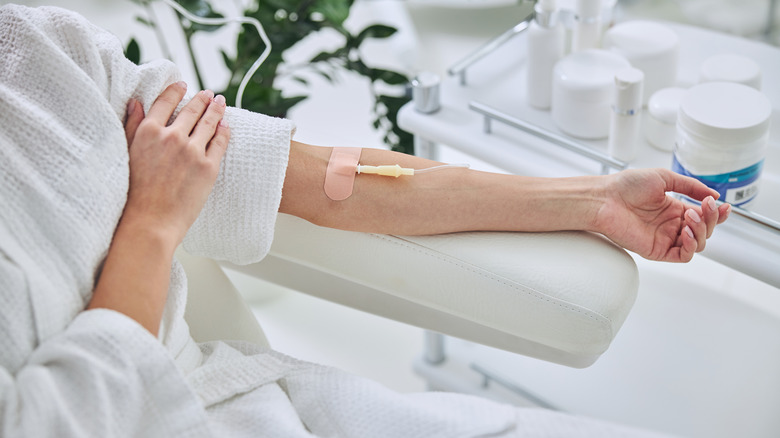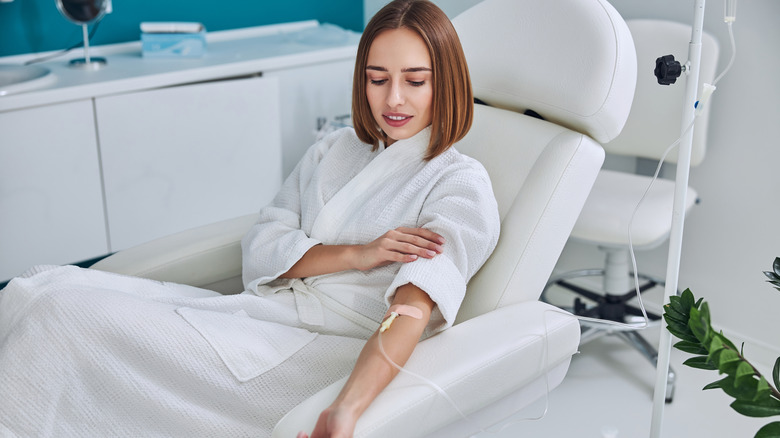Is Taking Vitamins Via IV Therapy Better Than Swallowing Them?
Celebrities can influence everything from fashion to beauty and, yes, even wellness trends, such as IV therapy. Rihanna, Chrissy Teigen, and many other notable names are said to be fans of IV therapy. This treatment takes, on average, 45 minutes and involves receiving vitamins and minerals through a catheter. Due to the COVID-19 pandemic, IV therapy rose in popularity among the average consumer. Although it can cost hundreds of dollars, IV therapy claims to provide increased hydration and immunity, prevent aging, and much more. Convenience is a bonus.
You can choose to go to a clinic specializing in IV therapy, or mobile services can come to you. Depending on where you go and the concerns you want to address, the drips provided vary. However, cocktails with vitamin C, vitamin B, and electrolytes are standard. Erika Schwartz, M.D., said to Health, "Anyone who wants to feel and look their best can benefit from an IV infusion. "
She explained, "The benefits are numerous: improved mental clarity, immune-boosting, defense against viruses and flu, body and mind fine-tuning, and even clearer, smoother skin (by supporting collagen production)." For these reasons and more, some experts believe that IV therapy is superior to oral supplements.
IV therapy allegedly increases the absorption rate of vitamins
IV therapy and oral supplements aim to provide the body with vitamins and minerals. While oral supplements are swallowed, vitamins via IV therapy enter the bloodstream through a vein. Experts like Anne de la Hunty, a senior nutrition scientist for the British Nutrition Foundation, told Harper's Bazaar UK that this is what makes IV therapy so effective. She notes that vitamins taken intravenously don't have to go through the digestive system, where they risk malabsorption. She said, "As the vitamins and minerals are not completely absorbed by this route, IV drips leads to higher blood levels of these substances than would be achieved by taking them orally."
This quick turnaround allows the nutrients to get absorbed better, allowing you to effectively reap the benefits of the vitamins you chose for your IV. Another pro to IV therapy is that you can customize your IV drip to your liking. But Dr. Sohère Roked, who provides IV therapy to his patients, feels differently. He told Get The Gloss, "I don't believe IV drips are a substitute for oral supplements, and they're not my first line of treatment, but I do feel they have a place. They can be useful with some of my patients in specific circumstances."
Roked added that he uses IV therapy "on a case-by-case basis." However, other experts say that IV therapy and its promises are misleading.
IV therapy might do more harm than good
Dr. Takács István from Semmelweis University in Budapest told the Daily Mail that he does not believe that IV therapy increases the absorption rate of nutrients in the body. He notes that IV therapy could ultimately lead you to take too much of a specific vitamin or mineral (your body can negatively react if you take too many vitamins), cause kidney issues, or become toxic. István went on to say that the best way to get vitamins and minerals is by eating a nutrient-rich diet.
Nutritionist Tim Hart told The Guardian that IV therapy is not all it's made it out to be. He said, "A lot of my clients spend hundreds on IV therapy because they believe it has an instant effect. But the reality is that a lot of the time it will be flushed out of the body — so they're mostly paying for quite expensive urine." There are other risks of IV therapy, too, including infections and allergic reactions.
Registered dietitian nutritionist (RDN) Lauren Harris-Pincus explained to Health that IV therapy is ideal for people with conditions that cause malabsorption. If not, she said, "At best, it's likely unnecessary" to get IV therapy. If you do decide to try it, make sure to consult your doctor first.


